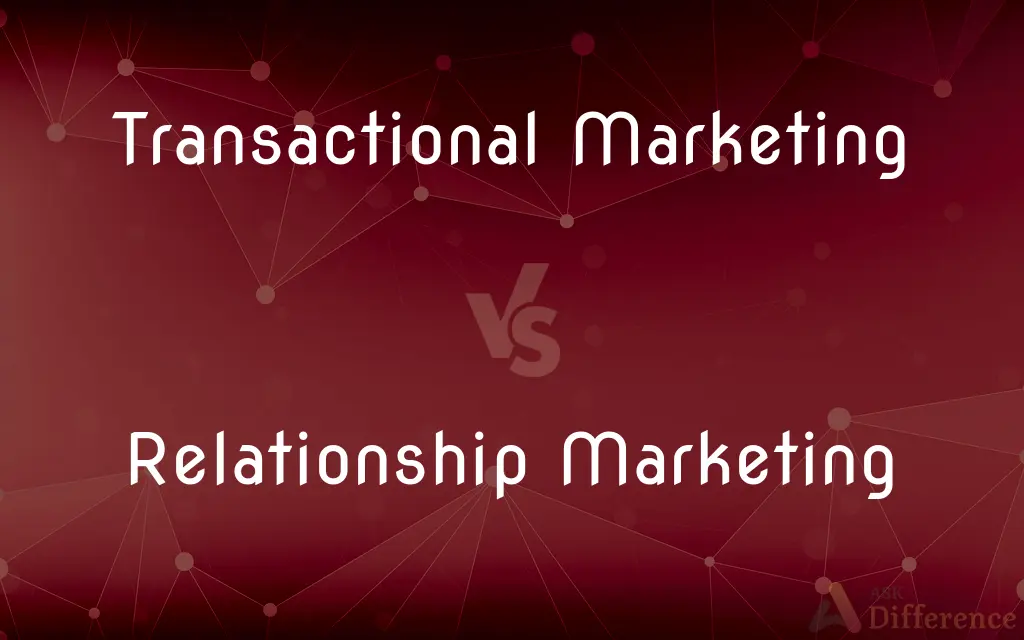Transactional Marketing vs. Relationship Marketing — What's the Difference?
Edited by Tayyaba Rehman — By Fiza Rafique — Published on December 15, 2023
Transactional Marketing focuses on individual sales and short-term gains. Relationship Marketing emphasizes building long-term customer connections and loyalty. Both have different goals and strategies for customer engagement.

Difference Between Transactional Marketing and Relationship Marketing
Table of Contents
ADVERTISEMENT
Key Differences
Transactional Marketing is a strategy that concentrates on maximizing the efficiency and volume of individual sales. It's a short-term approach where the primary objective is to enhance the number of individual transactions. Relationship Marketing, in contrast, emphasizes the importance of customer loyalty and long-term customer engagement.
The foundation of Transactional Marketing lies in the four Ps: Product, Price, Place, and Promotion. The primary focus is to create a seamless buying process and motivate immediate sales. Relationship Marketing, on the other hand, is grounded in the belief that longer-lasting relationships with customers can lead to greater long-term profitability.
Transactional Marketing often relies heavily on promotions, discounts, and mass advertising campaigns. It's about attracting as many customers as possible and incentivizing them to make a purchase. Relationship Marketing prioritizes customer service, engagement, and delivering value over time, ensuring customers remain loyal and continue business in the long run.
Transactional Marketing might see a customer as a one-time buyer, aiming to maximize the profit from each sale, even if it means not seeing that customer again. Relationship Marketing values the continuous relationship with a customer, understanding that repeat business, referrals, and customer loyalty can be more valuable than a single sale.
In a digital age, Transactional Marketing can be seen in online flash sales, one-time promotions, or impulse-buy tactics. Relationship Marketing manifests in loyalty programs, newsletters, personalized offers, and feedback loops, aiming to maintain a continuous dialogue with the customer.
ADVERTISEMENT
Comparison Chart
Focus
Individual sales
Long-term customer relationships
Duration
Short-term
Long-term
Key Tactics
Promotions, discounts
Loyalty programs, customer service
Customer View
One-time buyer
Continuous relationship
Goal
Immediate sales
Customer loyalty and repeat business
Compare with Definitions
Transactional Marketing
Prioritizes one-time transactions over long-term relationships.
The clearance event, with its deep discounts, exemplifies Transactional Marketing.
Relationship Marketing
Focuses on building long-lasting customer relationships.
Their loyalty rewards program is a testament to their Relationship Marketing efforts.
Transactional Marketing
Uses promotions and advertisements to incentivize purchases.
Their buy one get one free offer is a Transactional Marketing tactic to boost sales.
Relationship Marketing
Prioritizes customer loyalty and repeat business.
By sending personalized birthday offers to their clients, the brand showcases Relationship Marketing.
Transactional Marketing
Driven by immediate customer acquisition.
The company's heavy advertising campaign for its new product launch is rooted in Transactional Marketing.
Relationship Marketing
Emphasizes customer engagement and continuous dialogue.
The brand's monthly newsletter, updating clients on company news, is a Relationship Marketing strategy.
Transactional Marketing
Targets maximizing profit from each sale.
By offering limited-time discounts, the brand employed a Transactional Marketing strategy.
Relationship Marketing
Seeks to understand and cater to the evolving needs of customers.
Their feedback survey and prompt response system are driven by Relationship Marketing principles.
Transactional Marketing
A strategy focusing on individual sales.
The store's flash sale is a classic example of Transactional Marketing, aiming for immediate purchases.
Relationship Marketing
Invests in value delivery over the long term.
By offering exclusive early access to loyal customers, the brand exercises Relationship Marketing.
Common Curiosities
What's the main goal of Transactional Marketing?
The main goal of Transactional Marketing is to boost immediate sales.
How does Relationship Marketing build customer loyalty?
Relationship Marketing builds loyalty through continuous engagement, excellent customer service, and delivering long-term value.
Can a company use both Transactional and Relationship Marketing?
Yes, many companies employ a mix of both, depending on their objectives and customer base.
Are loyalty programs an example of Transactional or Relationship Marketing?
Loyalty programs are typically examples of Relationship Marketing.
How does Relationship Marketing benefit businesses in the long run?
Relationship Marketing can lead to repeat business, referrals, and increased customer lifetime value.
How do flash sales fit into these marketing strategies?
Flash sales are an example of Transactional Marketing, aiming for immediate sales.
Is Transactional Marketing more suited for any specific industries?
Transactional Marketing can be effective in industries with impulse buys or where long-term relationships are less crucial.
Which type of marketing emphasizes customer service more?
Relationship Marketing emphasizes customer service as a means to foster long-term relationships.
Are discounts and promotions exclusive to Transactional Marketing?
While they are key tools in Transactional Marketing, Relationship Marketing can also use them to reward loyal customers.
Which marketing type is more data-driven in understanding customer needs?
Relationship Marketing, as it seeks to understand and cater to evolving customer needs over time.
Share Your Discovery

Previous Comparison
Irish Wolfhound vs. Scottish Deerhound
Next Comparison
Alsatian vs. German ShepherdAuthor Spotlight
Written by
Fiza RafiqueFiza Rafique is a skilled content writer at AskDifference.com, where she meticulously refines and enhances written pieces. Drawing from her vast editorial expertise, Fiza ensures clarity, accuracy, and precision in every article. Passionate about language, she continually seeks to elevate the quality of content for readers worldwide.
Edited by
Tayyaba RehmanTayyaba Rehman is a distinguished writer, currently serving as a primary contributor to askdifference.com. As a researcher in semantics and etymology, Tayyaba's passion for the complexity of languages and their distinctions has found a perfect home on the platform. Tayyaba delves into the intricacies of language, distinguishing between commonly confused words and phrases, thereby providing clarity for readers worldwide.
















































